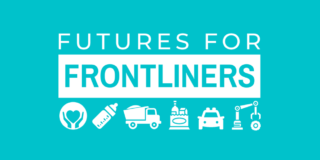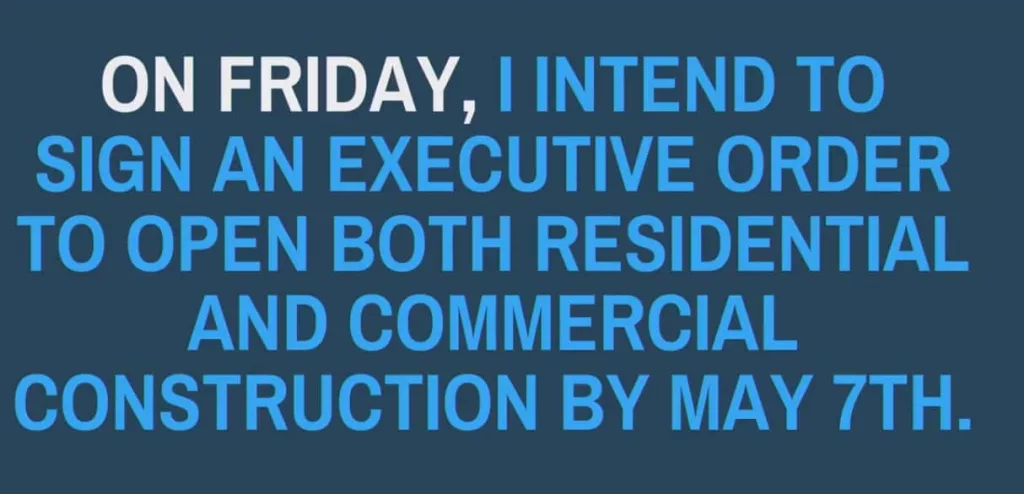In the next phase of her MI Safe Start program to safely reopen the Michigan economy, Governor Gretchen Whitmer today announced that on Friday she will sign an executive order to open both residential and commercial construction by May 7th. It was part of her thrice-weekly update during the current pandemic across the globe. 
She also announced key programs to help the future of front line workers and to make child care affordable and accessible for families across the state.
When questioned about why she would announce the plan for construction workers today but delay the start for nearly another week she said it was to allow the industry to prepare for a safe ramp up and to rehire laid off workers to get back to work.
For families in need of child care, the Governor says she has taken a significant step to help out, by rolling out a $130 million investment to make child care more affordable and accessible, saying, “Child care providers have been critical partners in helping our state respond to COVID-19, and we are extremely grateful for their service.” She says, “Every child care provider and early educator is important in giving parents some peace of mind while they are delivering essential services to our state at this challenging time.”
Michigan has created the “Child Care Relief Fund” to provide direct, non-competitive grants to child care providers. Those funds will help ensure:
- Child care providers currently serving essential workers remain open, and costs associated with providing care during the COVID-19 pandemic are not passed on to essential workers.
- Child care providers can stay afloat during the “Stay Home, Stay Safe” state of emergency.
- Child care is more affordable to families now, and as our economy begins to reopen.
- Child care providers across the state have the resources needed to reopen for Michigan’s workforce when the recovery process of the current COVID-19 pandemic begins and more families are in need of child care options.
Michigan’s Child Care Relief Fund consists of $100 million in federal CARES Act funding and $30 million from the state’s child care fund, both dedicated to be used only for child care services.
Licensed child care centers, family group homes, tribal child care providers, provisional disaster relief child care centers, and subsidized license exempt providers are all eligible for Michigan’s Child Care Relief Fund grants.
Grant recipients must commit to reducing their weekly rates for families by at least 10-percent, and provide care for children of essential workers regardless of where their parents or caregivers work. Grant recipients must also agree not to charge a fee to hold a child’s spot in a program while receiving grant funds.
State Superintendent Dr. Michael Rice says, “These funds will help sustain high quality child care that is vital for Michigan’s children and families,” and adds, “Whether it’s to help child care providers cover fixed costs like their mortgage, utilities, insurance, or payroll, we wanted the funds to be as flexible as possible to meet their specific needs.”
The Child Care Relief Fund will be administered by the Michigan Department of Education’s Office of Child Development and Care – with support from the governor’s office and the Michigan Department of Labor and Regulatory Affairs. Beginning today, April 29th, there will be a simple online application for child care providers to use at www.michigan.gov/childcare.
Grants start at $1,500 for home-based providers and $3,000 for child care centers. Additional funds will be awarded based on the size of the provider, whether they are open and serving essential workers, and their quality rating.
In addition to this grant program, Michigan has also made important changes to the Child Development and Care program, commonly called the child care subsidy.
Those changes ensure families can access the care they need and providers have some financial certainty. This includes continuing to review and approve applications; increasing the hours school age children can be in care; extending the deadline for re-determinations so families can continue to receive the subsidy during the crisis; and continuing to make subsidy payments based on the number of children enrolled in a program, not the number attending. 
Turning to the frontline people across the state who have been working around the clock for the rest of us, the Governor announced a new “Futures for Frontliners” G.I. Bill style of program for essential workers.
Whitmer announced a series of initiatives to help Michigan workers and their families during the ongoing COVID-19 pandemic, including the “Futures for Frontliners” program to provide a tuition-free pathway to college or a technical certificate to essential workers who don’t have a college degree. That includes workers like the ones staffing hospitals and nursing homes, stocking the shelves at grocery stores, providing child care to critical infrastructure workers, manufacturing PPE, protecting public safety, picking up trash, or delivering supplies.
The Governor says, “The Futures for Frontliners program is our way of saying ‘thank you’ to those who have risked their lives on the front lines of this crisis. This program will ensure tuition-free college opportunities and give these dedicated Michiganders an opportunity to earn a technical certificate, associate degree or even a bachelor’s degree,” and adds, “I want to assure all of our workers we will never forget those of you who stepped up and sacrificed their own health during this crisis. You’re the reason we’re going to get through this.” 
The “Futures for Frontliners” program is the first of its kind in the country, and was inspired by the federal government’s support of soldiers returning from World War II by providing educational opportunities. Frontline workers who take advantage of the program will also help reach her goal to increase the number of working-age adults with a technical certificate or college degree from 45-percent to 60-percent by 2030. The Governor says that she looks forward to working on enacting her proposal with the bipartisan legislative coalition that helped pass Reconnect last month, the program to offer adults over 25 without college degrees tuition-free access to community college.
Governor Whitmer also announced that she is expanding the state’s Workshare Program to allow employers to reduce employee hours to receive weekly unemployment insurance (UI) benefits as well as the additional $600 Pandemic Unemployment Assistance (PUA) weekly benefit. Both benefits will be funded through federal dollars. Through July, the program can act as supplemental pay for critical infrastructure workers by allowing them to collect the extra $600 per week.
Governor Whitmer also called on leaders in Congress to support Sen. Gary Peters’ Heroes Fund to provide hazard pay for frontline workers putting their lives on the line to ensure access to life-saving care, food, and other critical services during the pandemic. It is estimated that more than three million of these essential workers are currently on the job in Michigan. Supported by Sens. Stabenow and Peters, the Heroes Fund proposal would provide these workers with an additional $13 per hour, up to $25,000, with an additional potential recruitment incentive of up to $15,000 for essential medical workers.
Whitmer contends, “No Michigander should have to worry about how to feed their family or pay rent during a crisis. And no Michigander should be scared to go to work.” She adds, “From the beginning, my team and I have been working around the clock to solve those problems for working families. And I will continue to fight for our working people long after this crisis is over.”






